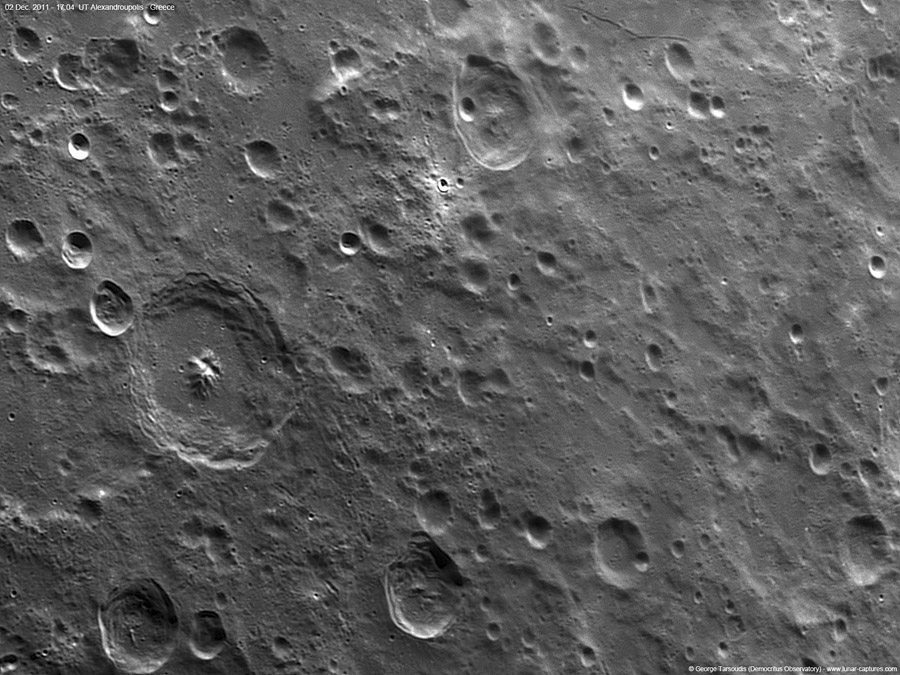Difference between revisions of "December 7, 2011"
| Line 3: | Line 3: | ||
<!-- ws:start:WikiTextHeadingRule:0:<h1> --> | <!-- ws:start:WikiTextHeadingRule:0:<h1> --> | ||
<!-- ws:start:WikiTextLocalImageRule:6:<img src="/file/view/LPOD-Dec7-11.jpg/283102170/LPOD-Dec7-11.jpg" alt="" title="" /> -->[[File:LPOD-Dec7-11.jpg|LPOD-Dec7-11.jpg]]<!-- ws:end:WikiTextLocalImageRule:6 --><br /> | <!-- ws:start:WikiTextLocalImageRule:6:<img src="/file/view/LPOD-Dec7-11.jpg/283102170/LPOD-Dec7-11.jpg" alt="" title="" /> -->[[File:LPOD-Dec7-11.jpg|LPOD-Dec7-11.jpg]]<!-- ws:end:WikiTextLocalImageRule:6 --><br /> | ||
| − | <em>north to the left image by [mailto://gtarsoudis@gmail.com// | + | <em>north to the left image by [mailto://gtarsoudis@gmail.com// George Tarsoudis], Greece</em><br /> |
<br /> | <br /> | ||
The more images you take, the more you see on the Moon. George discovered a faint trace of something like a valley or a fault in the line joining the craters<br /> | The more images you take, the more you see on the Moon. George discovered a faint trace of something like a valley or a fault in the line joining the craters<br /> | ||
Piccolomini and Brenner. The feature is a scarp with the high side on the east (top) looking like normal highland terrain. On the west the surface within 10 km <br /> | Piccolomini and Brenner. The feature is a scarp with the high side on the east (top) looking like normal highland terrain. On the west the surface within 10 km <br /> | ||
| − | of the scarp seems like a series of small depressions, some having smooth fill. Bill Hartmann and Gerard Kuiper [http://www.lpl.arizona.edu/SIC/journal/pdfs/012_Hartmann_CommLPL_1962.pdf | + | of the scarp seems like a series of small depressions, some having smooth fill. Bill Hartmann and Gerard Kuiper [http://www.lpl.arizona.edu/SIC/journal/pdfs/012_Hartmann_CommLPL_1962.pdf noticed] this about 50 years ago when they <br /> |
recognized impact basins and their systems of concentric and radial patterns. The bigger scarp cut by Piccolomini is the continuation of the Altai Scarp rim <br /> | recognized impact basins and their systems of concentric and radial patterns. The bigger scarp cut by Piccolomini is the continuation of the Altai Scarp rim <br /> | ||
of the Nectaris Basin. The unnamed Piccolomini-Brenner scarp is radial to the center of Nectaris and thus somehow tied to that basin's formation. This could <br /> | of the Nectaris Basin. The unnamed Piccolomini-Brenner scarp is radial to the center of Nectaris and thus somehow tied to that basin's formation. This could <br /> | ||
| Line 13: | Line 13: | ||
may be radial fault, similar to ones that cut through the Apennine rim of the Imbrium Basin. <br /> | may be radial fault, similar to ones that cut through the Apennine rim of the Imbrium Basin. <br /> | ||
<br /> | <br /> | ||
| − | <em>[mailto:tychocrater@yahoo.com | + | <em>[mailto:tychocrater@yahoo.com Chuck Wood]</em><br /> |
<em>70 years ago the world was at war, but now, our group of lunatics in many lands share and admire each others images and skills. It is good that the</em> <em>Moon helps</em> <br /> | <em>70 years ago the world was at war, but now, our group of lunatics in many lands share and admire each others images and skills. It is good that the</em> <em>Moon helps</em> <br /> | ||
<em>us be friends.</em><br /> | <em>us be friends.</em><br /> | ||
Revision as of 17:42, 11 January 2015
Non-Concentric Basin Scarp

north to the left image by George Tarsoudis, Greece
The more images you take, the more you see on the Moon. George discovered a faint trace of something like a valley or a fault in the line joining the craters
Piccolomini and Brenner. The feature is a scarp with the high side on the east (top) looking like normal highland terrain. On the west the surface within 10 km
of the scarp seems like a series of small depressions, some having smooth fill. Bill Hartmann and Gerard Kuiper noticed this about 50 years ago when they
recognized impact basins and their systems of concentric and radial patterns. The bigger scarp cut by Piccolomini is the continuation of the Altai Scarp rim
of the Nectaris Basin. The unnamed Piccolomini-Brenner scarp is radial to the center of Nectaris and thus somehow tied to that basin's formation. This could
be a basin secondary crater chain, like the Rheita Valley, but the asymetric edges - a scarp on one side and nothing on the other - suggests that the feature
may be radial fault, similar to ones that cut through the Apennine rim of the Imbrium Basin.
Chuck Wood
70 years ago the world was at war, but now, our group of lunatics in many lands share and admire each others images and skills. It is good that the Moon helps
us be friends.
Technical Details
Dec 2, 2011, 11:04 UT. Newtonian 10 inch @f/6.3, camera Unibrain fire-i 785, filter Red, barlow 3X.
Related Links
Rükl plate 68
www.lunar-captures.com



